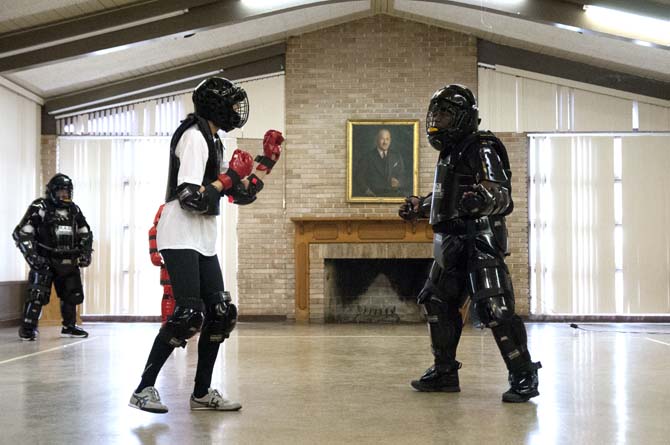According to the National Sexual Violence Research Center, one in five women are raped in their lifetime. Rape is the most under-reported crime, as numerous victims fear their assailants will seek revenge.
Many of these unwanted encounters occur on university campuses, meaning 27 percent of college women experience some form of sexual assault. This epidemic has ignited a desire for justice among victims who refuse to stay silent. Powerful movements like #MeToo and #TimesUp have encouraged women to share their sexual assault stories and create organizations to spread awareness.
The University’s Police Department and Student Health Center created Rape Aggression Defense, a self-defense program that provides helpful techniques women can use to protect themselves against sexual violence. The 12-hour course is given each fall and spring semester over three days. Baton Rouge college students pay $25 and the general public pays $45. The class is given in the Nelson Memorial Building.
On the first day, the assistant director for the University’s Wellness and Health Promotion, Kathy Saichuk, taught how women can be aware of their surroundings and minimize the risk of attack. The next two days are focused on physical defense, as women learn verbal and nonverbal cues to show their assailant they are capable of fighting back.“What if someone tried to abduct you?” said Saichuk. “You really need to think about what you would do. Constantly play that game with yourself.”
I had the privilege of attending this informative and life-changing program. Four well-trained instructors, which included Saichuk and the University’s police officers, guided us and pushed us out of our comfort zones as we acquired new self-defense skills. The instructors were motivational and taught us how to perform moves with control and confidence. After practicing the technique as a group, we broke up into smaller groups and practiced individually against one of the instructors.
The instructor who resonated with me the most was Lt. Jeffrey Lemoine. He has been involved in the program, teaching women skills, for 16 years. His soft eyes turned menacing during physical training and assessment. This was helpful to me because it made the situation more realistic and prompted me to focus on defending myself and escaping.
“Now, especially with the #MeToo movement, there’s a lot more emphasis on defending yourself from sexual assault and any sexual misappropriation,” Lemoine said.
On the last day, we were put in protective gear along with two male instructors who performed the role of assailants. We were lined up and put in realistic scenarios. The goal was for us to use the new skills learned to escape our attackers. Returning members had more challenging scenarios than new members.
I thought I was going to forget the techniques learned when it was my turn to complete assessment. However, the skills came instinctively. I was able to escape my assailant quickly with the proper moves I practiced during class and at home. My confidence grew with each scenario I was put in.
At the end of the course, we watched videos of our assessment to allow us to applaud the techniques we strengthened and acknowledge the techniques we needed to sharpen.
The University should require every girl to take this course before they graduate. The skills learned are beneficial in case of an experience with sexual harassment. The program caused me to have new-found confidence, make new friends, educate myself on sexual harassment and learn helpful techniques I can use to ward off a potential assailant.
Jasmine Edmonson is a 20-year-old mass communication sophomore from Denham Springs, Louisiana.
Opinion: R.A.D. should be required course for graduation
September 29, 2018
A woman prepares to fight an instructor at Rape Aggression Defense Class, a self-defense course for women, Sunday, Feb. 23, 2014 at the Nelson Memorial Building.





